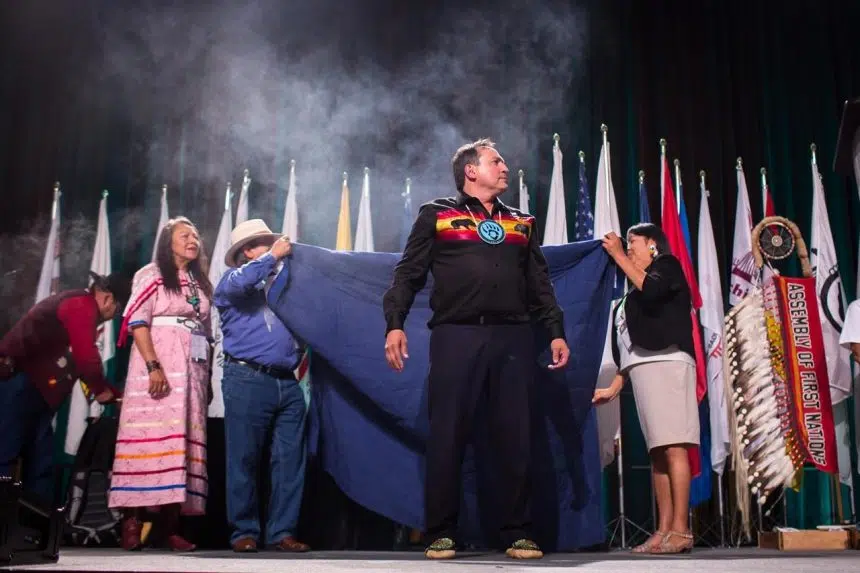VANCOUVER — Perry Bellegarde has reclaimed his seat as national chief for the Assembly of First Nations, in an election that also saw his challengers accuse the federal government of interference.
Bellegarde won 328 of the 522 votes in a second ballot, giving him just over the 60 per cent needed to be elected as leader for a second term.
Bellegarde, who is from the Little Black Bear First Nation in Treaty 4 territory in Saskatchewan, has said his close relationship with the federal government has secured billions of dollars in new funding for Indigenous issues over the last three budgets. He has been criticized by other candidates for being too cosy with Ottawa.
Following his election, he said the assembly’s strong voice has meant positive change for Indigenous communities.
First Nations leaders are “bringing about policy and legislative change, and starting to see investments in education, in water, in housing, in health care, and commitments to really do something vital to our survival as Indigenous peoples by bringing about the Indigenous Languages Revitalization Act. So (the federal government is) responding to our agenda that we’re putting in front of them,” Bellegarde said.
Sheila North of Manitoba won 125 votes, Miles Richardson of B.C. won 59 votes and Russ Diabo of Quebec won 10 votes.
Katherine Whitecloud of Manitoba was eliminated in the first round of voting for having the fewest number of votes.
The vote in Vancouver sparked some controversy, as all four of Bellegarde’s challengers claimed election interference by the federal government because Crown-Indigenous Relations Minister Carolyn Bennett was at the convention during the vote.
“Our four candidates are standing together to make sure at least the integrity of our decision(-making) political process is protected and honoured amongst our people. We do not condone the interference of the federal government, and anyone who does should be accountable to this assembly,” Richardson said.
North said Bennett’s presence represented a “disgusting display of interference” and a direct attack by the Liberal government on the assembly, while Diabo called for the minister to be sanctioned.
“This is what we’re talking about, running our own affairs. We don’t need the federal government to interfere in our elections,” she said.
Both North and Richardson said they accepted the election results in their concession speeches, while Diabo said there would be consequences — a statement that was met with boos from the audience.
Bennett’s office issued a statement saying the minister was invited by Chief Marlene Poitras of Alberta to listen to her regional concerns, and at no point was the election for national chief discussed.
“In no way did the minister interfere in the electoral process for national chief. This is a decision for First Nations to make without outside interference,” the statement said.
Bellegarde said he considered it the right of the Alberta caucus to invite the cabinet minister.
“They’ve got regional issues and national issues of concern they wanted to raise directly to the minister and that’s their right, that’s their call,” he said.
Bellegarde said he will use his next term to continue working with federal and provincial governments to improve quality of life for Indigenous peoples, including closing the gap in youth suicide rates, which are five to seven times the national average, and putting resources toward the 40,000 First Nations children who are in foster care.
“This gap is not good for us and it’s not good for Canada. So once we start closing this gap it’s good for our people but ultimately it’s good for the country as a whole,” he said.
The Canadian Press







